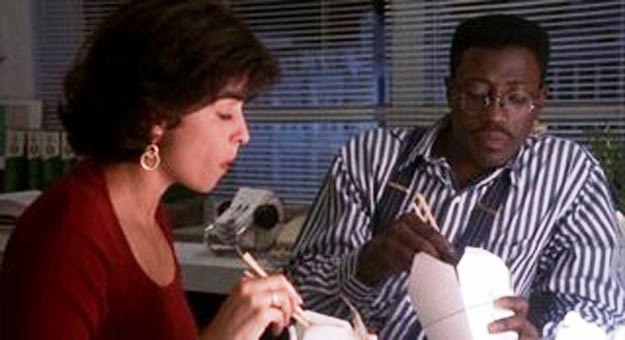Jungle Fever
Parade of prejudices
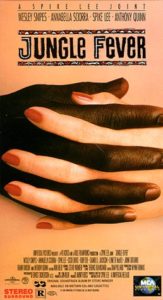 It is sad to realize that the world seems to be going backwards when one thinks of interpersonal relationships, values and concepts. In recent years we have been immersed in an environment where hate speech seems banalized and even accepted by many, at a level rarely seen since World War II. It comes as odd as Spike Lee’s “Jungle Fever” (USA, 1991) looks painfully current.
It is sad to realize that the world seems to be going backwards when one thinks of interpersonal relationships, values and concepts. In recent years we have been immersed in an environment where hate speech seems banalized and even accepted by many, at a level rarely seen since World War II. It comes as odd as Spike Lee’s “Jungle Fever” (USA, 1991) looks painfully current.
In addition to the drug problem, “Jungle Fever” deals about racial prejudice.This makes us happy to live in Brazil, where the mix of races is a value and this sad reality does not exist. Truth? Well, as my grandmother used to say, not so much to the sea, not so much to the land. “Jungle Fever” does not talk only about racial discrimination, and speaking of intolerance, Brazil is full to the bottleneck.But, let’s do it by steps.
 The film tells the story of Flipper and Angie, who live a distressed love story in the urban jungle of New York.Flipper (Wesley Snipes) is a young and successful black architect who lives in Harlem with his wife and daughter.Very correct, Flipper follows every day from home to work, an important architectural firm, where he has successfully covered all possible positions and assignments.
The film tells the story of Flipper and Angie, who live a distressed love story in the urban jungle of New York.Flipper (Wesley Snipes) is a young and successful black architect who lives in Harlem with his wife and daughter.Very correct, Flipper follows every day from home to work, an important architectural firm, where he has successfully covered all possible positions and assignments.
It is there that he meets Angie (Annabella Sciorra), an Italian-American who is hired for temporary administrative service.After a long period working together, they fall in love and live a torrid romance, oblivious to the differences between the two.
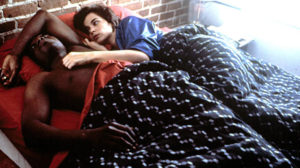 Aware that they lived an adventure, they decide to keep their lives as they are, he with the family, she with an old boyfriend. However, indiscretions on both sides precipitate things, and both are forced to leave their homes and move in together.
Aware that they lived an adventure, they decide to keep their lives as they are, he with the family, she with an old boyfriend. However, indiscretions on both sides precipitate things, and both are forced to leave their homes and move in together.
Even though they are adults, free and financially independent, the two are submitted to a festival of intolerances that goes from bad service in restaurants to families rejection, even by police brutality.Their ability to withstand pressures only goes as far as they really feel for each other.
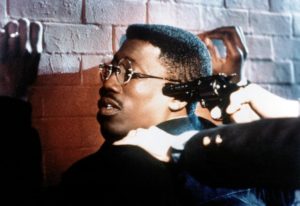 This movie deals with prejudices. Lots of it. Discrimination at work, cultural, social, religious, sexual and obviously racial. It is a mutual accusation of racism when Flipper demands an African-American secretary and his boss hires an Italian-American one. It’s the dark Italian who complains about the blond WASP American. It is black women’s claim that black guys themselves only want the clearest girls. It is the whites’ claim that blacks “invaded” sports. It is discrimination against the mestizos, by being “weakening” the race.And so it goes.
This movie deals with prejudices. Lots of it. Discrimination at work, cultural, social, religious, sexual and obviously racial. It is a mutual accusation of racism when Flipper demands an African-American secretary and his boss hires an Italian-American one. It’s the dark Italian who complains about the blond WASP American. It is black women’s claim that black guys themselves only want the clearest girls. It is the whites’ claim that blacks “invaded” sports. It is discrimination against the mestizos, by being “weakening” the race.And so it goes.
It is foolish to think that prejudice is only racial. Replace “black” with “poor”, “old”, “Indian”, “gay”, “woman” and so many other classifications, that the result will be identical. What if we transported the couple to Brazil, being Flipper a mature man (of any race) and Angie a much younger woman?
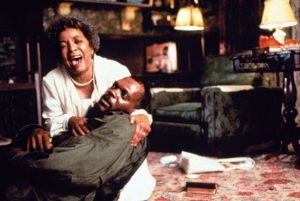 Unless the citizen is a rich and influential man, the rejection will be the same as seen in the film. There was too many people who criticized the couple Marília Gabriela x Gianecchini or at the blondes who marry pagodeiros and soccer players.
Unless the citizen is a rich and influential man, the rejection will be the same as seen in the film. There was too many people who criticized the couple Marília Gabriela x Gianecchini or at the blondes who marry pagodeiros and soccer players.
Prejudice is a preconception, that is, a judgment of value based on preconceived concepts. Spike Lee was very wise to perceive and show it through his characters, not only the alienated Flipper, but the woman repressed for being mongrel, the pastor father who sees the devil in everything but his own past, and so many more.True, just the crack-addicted son, masterfully lived by Samuel L. Jackson. In one of his most anthological speeches, he says to his mother: “Mother, I smoked the damn television!”
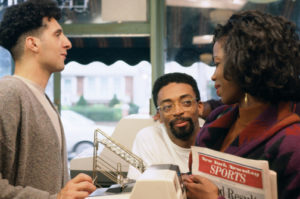 In a film that deals with relationships between people, casting is paramount. Wesley Snipes, more used to action movies, and Annabella Sciorra, who would star in several films from this, play the central couple. There is also the aforementioned Jackson, John Turturro as Angie’s boyfriend, Ossie Davis as the Good Reverend and Anthony Quinn as the father of Turturro.Spike Lee himself acts as the indiscreet friend of Flipper, and the stunning Hale Berry, who plays here a small role here, would win the Oscar for Best Actress in 2002 for the film “Monster’s Ball”.
In a film that deals with relationships between people, casting is paramount. Wesley Snipes, more used to action movies, and Annabella Sciorra, who would star in several films from this, play the central couple. There is also the aforementioned Jackson, John Turturro as Angie’s boyfriend, Ossie Davis as the Good Reverend and Anthony Quinn as the father of Turturro.Spike Lee himself acts as the indiscreet friend of Flipper, and the stunning Hale Berry, who plays here a small role here, would win the Oscar for Best Actress in 2002 for the film “Monster’s Ball”.
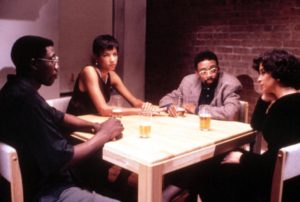 Although the film deals with prejudices, Spike Lee did not do it as a complaint but as evidence of the facts.What it does – or fails to do – the difference is the attitude of the people. Like the character of Turturro who literally confronts his friends to live what he believes, while the the black romeu gives up facing the barriers, preferring accommodation. “You were just curious, like me …”. Or the fanatic Reverend, who resolves to fight the devil with more than prayers. Applauses for Angie, the brave person of the story and for Spike Lee, for taking to the screen this beautiful poem of love and hate, deception and resignation, acceptance and attitude.
Although the film deals with prejudices, Spike Lee did not do it as a complaint but as evidence of the facts.What it does – or fails to do – the difference is the attitude of the people. Like the character of Turturro who literally confronts his friends to live what he believes, while the the black romeu gives up facing the barriers, preferring accommodation. “You were just curious, like me …”. Or the fanatic Reverend, who resolves to fight the devil with more than prayers. Applauses for Angie, the brave person of the story and for Spike Lee, for taking to the screen this beautiful poem of love and hate, deception and resignation, acceptance and attitude.
Original Title: “Jungle Fever”

